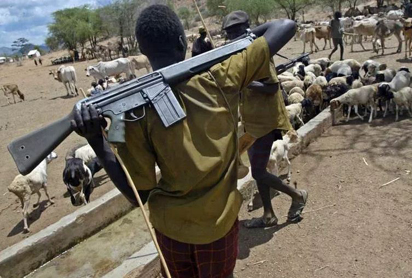Fulani herdsmen in Nigeria have said cattle ranching in Nigeria is a total failure and would not accept the ranching because the country’s geographical location was not suitable for it.
According to the herders, the anti-open grazing laws being established by state governments would die a natural death like ‘political sharia law’ in Zamfara.
Addressing newsmen, yesterday, in Abuja, through their socio-cultural association, under the aegis of Miyetti-Allah Kautal Hore, the Fulani insisted that events in history showed that ranching was not practicable in Nigeria.
To this end, they urged the Federal Government to immediately stop state governments from enacting anti-open grazing laws.
National Secretary of Miyetti-Allah Kautal Hore, Saleh Alhassan, who read the association’s prepared speech to newsmen at the event, called on the Federal Government to stop state governments, especially Benue and Taraba states, from going ahead with implementing the laws.
He said: “The whole experiment of ranching in Nigeria is a total failure, you can google it, it’s there on the Internet for everyone to see.
“ Right from the 70s,the old Gongola State had experimented ranching, the same with Kaduna State and even the old Plateau State. All the ranches collapsed because the geographical location of this country is not suitable for ranching.
“In places where there are successful ranching in the world, the volume of rain per annum in those areas is at least four to seven months, that’s why you have grasses that can naturally be sustained.
“At the same time, you must have the necessary breeds that will support even ranching. The current breeds we have in this country cannot be supported by ranching.
“Anywhere you keep these volume of cows we have now, for two weeks, they will eat out everything and you will have ecological disaster, “he said.
“ We view the anti-grazing law as an agenda to destroy our means of livelihood by visionless and desperate politicians.
“Anti-grazing laws are nothing but populist agenda designed by visionless and desperate politicians to destroy our means of livelihood.
“This dangerous gambit must be nib in the bud by the federal government through the security agencies as it portends great danger to the cooperate existence of the country.
“These laws are oppressive and negative and are fundamentally against our culture as Fulani pastoralists, against our economic interest and against the constitution of the Federal Republic of Nigeria.
“ It is important to note that inter-state movement of pastoralists is similar to inter-state commerce and it is only the National Assembly that can legislate on that aspect as captured in item 62 of the exclusive legislative list. So no state governor can decide to stop movement of pastoralists because that is their own form of commerce. So, they have gone against the constitution.
“The laws do not take into cognisance our sociology, our economic interest, our production patterns, climate variations and factors that pushed pastoralists into these migrations. These migrations are not picnics, they are detected by ecological needs.
“It is a common knowledge that the primitive form of agriculture practiced in Benue and Taraba states and indeed all over the country, is not consonant with global best practices.
“ So why singling out the pastoralists and insist that they must ranch which is the global best practice? That’s out argument.
“If the whole agricultural policy, the whole development of agriculture in Nigeria is still at this primitive stage, you cannot single out the herders who are also farmers that they must practice global best practice, it’s not possible.”
“Again, very fundamentally,the River Benue and the tributaries and also the international routes and roads that pass through Benue don’t belong to Benue State Government, they belong to the Federal Government. Benue State Government has no jurisdiction over River Benue, its tributaries, the lakes, the river basins, they are all federal government’s. So how do you now start to legislate to say ‘you are going to stop access to those natural resources?’
“Between January and early May,is when pastoralists move to the river basins because that is the peak of dry season and most of the rivers pastoralists use to water their animals dried up and they now move towards the River Benue.
“So designing a policy that will exclude the herders completely is wrong, what they should have done is to have restricted areas for the herders and then give them access to grazing corridors and watering points during those peak periods of dry season.
“As cultivation comes up during the rainy season, these people naturally migrate northwest. So, it’s detected by climatic changes. That’s why we are saying it’s not possible, the law will not work because it’s not well thought out.
“Then for you to create a ranch, the environmental impact assessment must be done on the areas earmarked for the ranch, and it must not take a minimum of two to three seasons. That’s to say you must do studies during the wet season, do studies during the dry season and then repeat it so that you compare before you can say this place is suitable for a ranch.
“So ranch is technologically driven, it’s capital intensive and it’s not practicable for this kind of subsistence farmers we have, the livestock farmers are subsistence farmers. It’s just like saying nobody will cultivate his land if he doesn’t own a tractor, so how many people will go to farm?
“So, it’s not that we don’t want to respect law and order but when you make an impossible laws, then you are not creating peace. You are either deliberately attempting to provoke conflict for either political reasons or you are being hoodwinked and deceived by desperate political advisers just probably because they want to get money out of you, they make you create laws that will create conflict.”



Leave a Reply